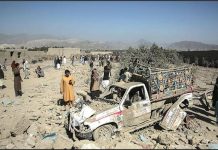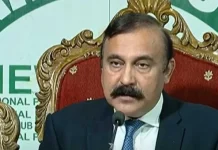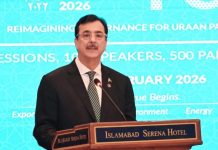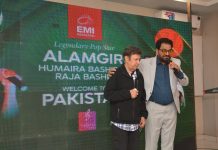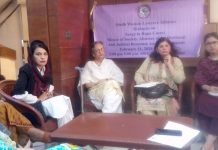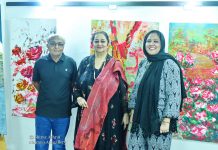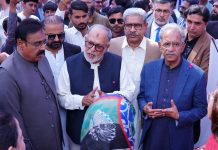The audiencewas amused by melodious Bengali Songs
A beautiful Melodious and patriotic song was sung by Mrs. Mahbubul Alam

(Karachi): UNESCO International Mother Language Day was celebrated at Bangladesh Deputy High Commission Karachi on Friday 21st February 2025. The event was attended by the Consul General of Oman H.E Eng. Sami Abdullah Alkhanjari, Consul General of Malaysia H.E Herman Hardynata Ahmed, CG Republic of Ethiopia H.E Ibrahim Khalid Tawab, Mr. Khalid Tawab Chairman Tawab Group of Companies, CEO and Chief Editor the News Lark, Mr. Jawed Ahmed Malik, Dr. Syed Mehboob Senior Research Editor The News Lark, Former Director Research Karachi Chamber of Commerce and Industry, Senator Ms. Khush Bakht Shujat, Mr. Shujat Ali Baig, Mr. Nazakat Jadoon Senior Manager Sales Business Recorder and others participated in this beautiful and unique programme. Pakistan and Bangladesh are moving towards new warmth in their relations and several steps are taken in this regard. The News Lark is committed to promoting these relations and is part of serious efforts to enhance Pakistan-Bangladesh relations. The Programme was ornamented with beautiful and melodious Bengali songs. The special segment of this programme was a beautiful and melodious patriotic song sung by Mrs. Mahbubul Alam, which was liked and appreciated by everyone. At the end of the program people left the premises having the fragrance of love and warmth of Bangladeshi hospitality in their minds and hearts, exhibited by CG Bangladesh Mr. Mahbubul Alam.

UNESCO has been observing the Silver Jubilee Celebration of International Mother Language Day- 2025 on 21-22 February this year. UNESCO attaches huge importance to preserving linguistic diversity and promoting mother tongues across the world. Languages are essential to education and sustainable development, serving as the primary means through which knowledge is transferred and cultures are preserved. With approximately 8,324 languages in the world today, many are at risk of disappearing due to globalizationand societal changes. Ensuring that education systems support the right to learn in one’s mother tongue is crucial for improving learning outcomes, as students who are taught in a language they fully understand show better comprehension, engagement, and critical thinking skills.
UNESCO emphasis that multilingual education, particularly for minority and indigenous languages, not only helps learners but also fosters a deeper connection between education and culture, contributing to more inclusive and equitable societies. Multilingual education not only promotes inclusive societies but also aids in preserving non-dominant, minority, and indigenous languages. It is a cornerstone for achieving equitable access to education and lifelong learning opportunities for all individuals.

The 25th anniversary of International Mother Language Day celebrates a quarter-century of efforts by UNESCO to preserve linguistic diversity and promote mother tongues. This milestone emphasizes the importance of language preservation in safeguarding cultural heritage, improving education, and fostering more peaceful societies. International Mother Language Day, first proclaimed by UNESCO and later adopted by the UN General Assembly, underscores the role of languages in promoting inclusion and achieving Sustainable Development Goals.
Languages, with their complex implications for identity, communication, social integration, education, and development, are of strategic importance for people and the planet. Yet, due to globalization processes, they are increasingly under threat or disappearing altogether. When languages fade, so does the world’s rich tapestry of cultural diversity. Opportunities, traditions, memory, unique modes of thinking and expression — valuable resources for ensuring a better future — are also lost.

UNESCO is concerned that in every two weeks a language somewhere across the globe disappears taking with it an entire cultural and intellectual heritage. UNESCO estimates that there are 8,324 languages, spoken or signed. Out of these, around 7,000 languages are still in use. Only a few hundred languages have genuinely been given a place in education systems and the public domain, and less than a hundred are used in the digital world.
Multilingual and multicultural societies exist through their languages, which transmit and preserve traditional knowledge and cultures sustainably. International Mother Language Day is observed by UNESCO every year to promote linguistic and cultural diversity, multilingualism, unity in diversity, and international understanding, through multilingualism and multiculturalism.
The Bangladesh Deputy High Commission in Karachi has been striving to promote cultural cooperation and enhanced people-to-people contacts.
***

